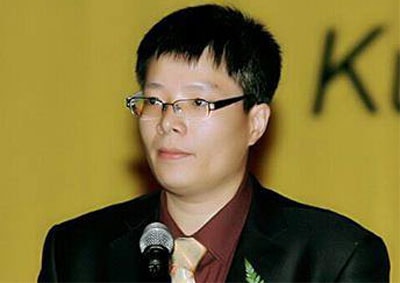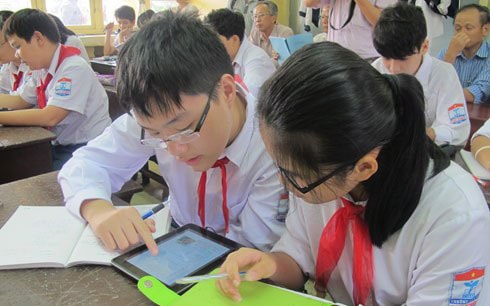Vietnamese professor abroad discusses 4,000 billion VND project to buy tablets
According to Professor Tran Hai Linh, lecturer at Inha University, South Korea, the project proposes a "huge" amount of money but the effectiveness is not yet clear...
The project to digitize textbooks for students from grades 1 to 3 in Ho Chi Minh City with a budget of about 4,000 billion VND is receiving many mixed opinions from the public. According to the project, the content in textbooks for subjects from grades 1 to 3 will be digitized using 3D technology, each student will use a separate tablet. This project of Ho Chi Minh City is waiting for the Ministry of Education and Training to approve. However, the project is facing many reactions about its feasibility.
4,000 billion: A "huge" amount of money but no results yet
Although teaching abroad, Professor Tran Hai Linh, a lecturer at Inha University, Korea, is quite interested in this issue. Professor Tran Hai Linh believes that if textbooks can be digitized, primary school students in Vietnam will have less trouble because they will not have to carry a large amount of books on their backs to school every day. But the question is whether every family can participate in this program or not? In the current situation, just worrying about their children having enough conditions to go to school is quite difficult for most families. How will this device be managed? How much time do teachers need to get used to and teach students through this device?
 |
| Professor Tran Hai Linh, lecturer at Inha University, Korea |
Professor Tran Hai Linh, lecturer at Inha University, Korea
Professor Tran Hai Linh also wondered if teaching with tablets would limit children's life skills and development. Does frequent exposure to electronic devices affect children's eyesight and health? These questions need to be addressed and considered in accordance with the situation of families with young children of this age in Vietnam. "I think before proposing or implementing the project, please listen to the wishes, needs and opinions of parents, even your students," said Professor Tran Hai Linh.
According to Professor Tran Hai Linh, each tablet will cost from 3-5 million VND. According to this project, the cost will be paid by the parents themselves, the budget will only support policy beneficiaries. This is not a small amount of money for each family that is still in difficulty. As for the cost of training and building facilities, according to the project, the cost to train a team of Principals abroad is 250 million VND/person, teachers is 55 million VND/person, if calculating about 450 primary schools participating in the project, that is 450 Principals and thousands of teachers. "So when multiplying the total cost, there will be a number that will surprise many people, but the actual effectiveness is not yet clear."
Professor Tran Hai Linh said that in Korea, schools usually build only a few common classrooms, these classrooms are often called "smart" classrooms. These rooms will be fully equipped with computer-based learning programs with online support software, projectors, large screens or modern electronic visual education tools... These rooms are used for general learning needs and are enough to meet the needs of the entire school's students.
In Korea: Elementary school students "play the most"
 |
After school hours, families can register their children to participate in development and extracurricular programs after school hours, depending on their age, with subjects such as: foreign languages, aerobics, soccer, martial arts, dance, modern dance... to develop personal skills. Depending on the child's health condition, the child's wishes, the family's economy as well as the parents' working hours to choose the most suitable classes for their children.
Professor Tran Hai Linh said that in addition to teaching knowledge to students, elementary schools in Korea also pay great attention to creating a fun environment and training the body and health by equipping small stadiums with "green space", installing outdoor gym equipment, rope swings, swings, slides... within the clean and safe playground of the school. All of these equipment are very safe, suitable for each age group. In this type of school, children learn very comfortably, according to their interests and hobbies and are not constrained by rules. In school, each student will have a locker to put their books and personal belongings in. After finishing school, students can arrange and put them away, rarely having to carry books for all subjects home.
Primary education in foreign countries is based on the concept of “playing to learn, learning while playing, but very effectively”. For example, primary school students in Korean schools “play mainly” but play to learn and learn through games. They learn to read, write and do math, not only through textbooks but through many different forms.
In Vietnam: Students only know how to study, have little time to play.
Commenting on the Primary School program in Vietnam, Professor Tran Hai Linh said that the primary education program in Vietnam is still quite heavy for this age group. The program requires students to absorb a lot of general knowledge. Primary school students in Vietnam in the past mostly only knew how to study and study more, without time to play, practice sports and develop other important abilities such as initiative, independent thinking, exploration and discovery.
“Students often have to accept absolutely the knowledge from teachers and textbooks, whether right or wrong. Students rarely have the opportunity to explore, think independently, question, discuss, express opinions, and discover what suits their interests. This teaching method does not help students develop their personal style, creativity and communication skills,” said Professor Tran Hai Linh.
According to Professor Tran Hai Linh, the curriculum is rarely flexible because all students have to study the same program at the same time, regardless of the differences in the psychological development of each individual and at each age, in each family situation, in the locality, and in the local cultural conditions. General knowledge is often heavy on scientific theory but light on understanding applied knowledge. Because it is often learned by cramming, students quickly forget knowledge that does not match their interests, circumstances, or level of psychological development. The learning environment lacks group activities to develop soft skills that students can master themselves, and in this environment, most students cannot develop their communication and development skills.
Professor Tran Hai Linh believes that for primary school age children, especially from grades 1-3, the learning load should be reduced. Learning in class or homework should be light and simple so that students do not feel pressured by studying right when they first enter school. Students go to school but need time to play to develop their childhood naturally. Let them "play mainly" but "play to learn" and learn from the games themselves./.
According to VOV






